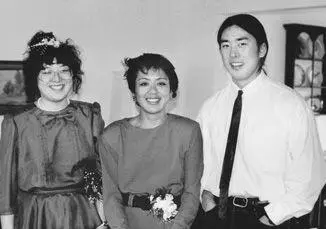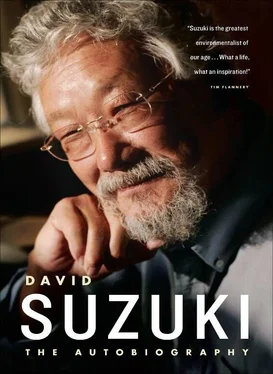Ev was a bit dubious, but we agreed to try it out. After Ruthie was born, we set up a playpen in my office at the University of British Columbia while Ev worked in the room adjacent. It worked very well. The baby slept a lot, and besides, I was out of the office most of the time anyway. Evelyn could feed or change the baby in the privacy of my office and still carry out her duties. What surprised me was the protest raised by faculty and students. Ruthie very seldom cried loudly enough to be heard outside my office, but people became aware there was a baby around, and rather than being intrigued by the experiment, academics were indignant at what they felt was an inappropriate presence in their hallowed halls. Fortunately the arrangement worked for long enough for Ev to be happy to find a sitter to take care of Ruth at home, and Ev worked for me for years after.
BEING A PARENT IS the most important thing I have done in life, and I have always been completely committed to my children, though not in the same way my father was. Through my childhood memories, it seems to me my father devoted a huge amount of his time to me. Whether at work or play, he included me on his trips, which were important parts of my formative years, and he spent hours listening to my childish prattle and questions, trying to respond and answer as fully as he could. I have failed to emulate that with my children.
After my first marriage had ended, I endeavored to be with the children every day I was in Vancouver and was aided by Joane's generosity in allowing me unrestricted access to them. But often my mind was distracted, not totally focused on them but off somewhere else. I was too selfish to give myself over to being Dad 100 percent, and I regret that, not only for the children's sake but also for my own. I was just unable to give myself totally to the moment and fully enjoy them.
Joane was my first love, and though we have met less and less often over the years, she has always had my greatest respect and gratitude for the years we did spend together and for never using the children as a weapon to punish me for my shortcomings. They had been conceived in love. When our marriage ended, we didn't negotiate conditions for the amount of money I would pay her in alimony because, as she told the stunned lawyer, “I trust Dave.” I have always tried to live up to that faith. I supported Joane so that she could be a full-time mother, a job she did wonderfully.

Laura, Tamiko, and Troy
When I told Joane seven years after our separation that my remarriage was going to be a financial strain, without a word of protest she told me she could resume her career now that Laura, our youngest, was in school. Well trained as a lab technician at Ryerson Institute of Technology in Toronto and experienced with the electron microscope at the University of Chicago, Joane was soon running the lab for Pat and Edith McGeer, the famous neurobiology team at UBC.
Tamiko went away to McGill University in Montreal and studied biology. She hoped to improve her French while she was there but was disappointed at how easy it was to continue speaking English. At McGill, Tamiko fell in love with Eduardo Campos, a Chilean Canadian who was enrolled in engineering and was a computer whiz. They married after graduation and decided to have a footloose life, working for periods and saving enough to travel to different parts of the world. They had decided they would forgo a family for a more gypsylike life.
But Eduardo's Latin American parents felt it was a mistake, and I did too. When Tamiko approached thirty, she began to reassess the decision, and in 1990 she gave birth to Tamo, my first grandson, and three years later to Midori, my first and (so far) only granddaughter. Tamiko has become one of those supermoms, holding down a job as a chromosome analyst in a hospital while caring for two supercharged children who have grown to be star athletes. Eduardo has used his fluency in Spanish and English to take jobs working in South America and spends a lot of time away from home. In many ways, Tami is repeating the role Tara has played in our home, multitasking because of the absence of her partner much of the time.
Tamo and Midori were born when Sarika was still a child, so suddenly I had a young daughter and grandchildren when I was spending a lot of time away. It has been unfair to my grandchildren that I have not had the time with them I wished for. I loved attending basketball games to cheer Sev and Sarika when they played in high school but have seldom been in town when Tamo and Midori have had hockey, soccer, snowboarding, and football competitions.
Grandchildren are such a delight because the relationship is so different from the relationship with one's children. Every human relationship — between lovers, parents, or children — has moments of frustration, anger, and resentment. It's inevitable, because we are human beings with fallibilities and needs that may conflict with those of others. But in a loving relationship, we work these conflicts out, and the benefits and joys more than offset those awkward or trying moments.
With grandchildren, however, there isn't the chafing that can result from living together day in and day out, so every get-together is a celebration and fun. We can do all those things with grandchildren that we carefully avoided as parents, like buying candy or extravagant toys, then drop them back with their parents to pick up the pieces. It is sheer joy and no responsibility. And because they don't live with us, grandchildren don't see all the flaws in us that their parents know so well — so they can just worship us for what they think we are. It's great.
When it became clear that we had the financial support to make the television series based on my book The Sacred Balance , Amanda McConnell had the brilliant idea of including Tamo, both to represent me as a child and as a reminder that the next generation had to be included in our perspective. Although I had taken Tamo when he was younger to experience seaweed camp in Gitga'at territory, I was nervous about spending so much time with him alone. “What do I do to keep him entertained?” I wondered. As an enticement on our first shoot, I met him in Florida and took him to Universal Studios, where we shared some incredible rides and had a delightful three days together. He was a wonderful companion and performer throughout the filming.
Laura chose to attend Queen's University in Kingston, Ontario, where she majored in psychology. I was delighted when she fell in love with and later married Peter Cook, a fellow cartoonist on the school paper and also a psychology major. Peter made Laura laugh and drew her out as a personality. Jonathan, their son, is a beautiful child who was found to have suffered oxygen deprivation at birth and has cerebral palsy, a debilitating problem of varying severity, depending on the area of the brain that is damaged. Jonathan has severe problems, will probably never walk, and though blind, he apparently has developed an alternate neural pathway that enables him to recognize symbols and patterns and actually to read.
What has been so impressive and humbling to me has been the parenting of this heroic young couple, Laura and Peter. They are magnificent parents, pouring love and energy into developing Jonathan's capabilities to the maximum. As my grandson has constrained their world and activities, success and joy have come from struggle and incremental achievements. I have often pondered how strong I would be were I faced with a severely disabled child, whether I would be up to the job. By their actions, Laura and Peter demonstrate the good and the potential that I hope are in all of us when adversity intervenes.
Читать дальше



![David Jagusson - Devot & Anal [Hardcore BDSM]](/books/485905/david-jagusson-devot-anal-hardcore-bdsm-thumb.webp)









